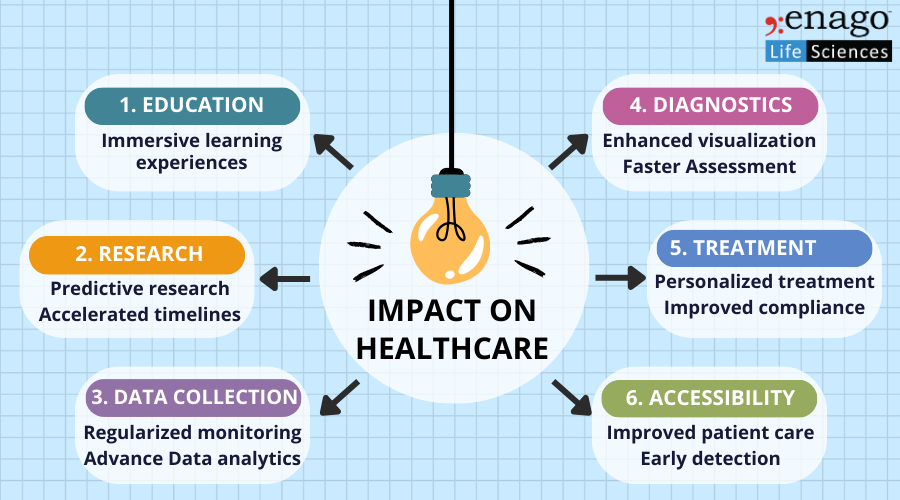Unveiling the future of medicine: Discover mind-boggling breakthroughs shaping the landscape of medical research today!

Image courtesy of Pixabay via Pexels
Table of Contents
In today’s rapidly changing world, medical research is at the forefront of innovation. At the heart of healthcare advancements, groundbreaking discoveries and evolving research work are paving the way for a brighter future. In this feature, we delve into the latest breakthroughs in medical research and explore the transformative impact they have on the ever-evolving healthcare landscape.
Pioneering Discoveries in Health Sciences
Medical research encompasses a vast scope that spans from genetics to artificial intelligence. Recent groundbreaking developments have revolutionized the field, offering hope to millions around the world.
Precision medicine, for instance, is transforming treatment approaches by tailoring therapies based on individual genetic profiles. This approach recognizes that each person’s genetic makeup influences their response to treatment, leading to more personalized and effective medical care.
Another remarkable advancement is seen in the field of immunotherapy, which harnesses the power of the immune system to fight cancer. This groundbreaking approach has shown unprecedented success in treating previously untreatable cancers, offering new hope and life-saving opportunities for patients.
Advances in gene editing and CRISPR technology have also ignited excitement within the medical community. Researchers are exploring the potential of gene editing tools to address genetic disorders, with the potential to one day cure previously incurable diseases at their root.
Artificial intelligence (AI) is prominently infiltrating the healthcare sector, enhancing diagnostic accuracy and treatment planning. AI-powered algorithms can analyze large datasets, detect patterns, and predict outcomes, helping physicians make informed decisions. The incorporation of AI into healthcare research promises improved patient care and cost-effective solutions.
The Evolving Field of Healthcare Research
Healthcare research is a dynamic and interdisciplinary field that constantly evolves to adapt to the changing needs of society. It encompasses a broad spectrum of research and comparative effectiveness studies that shape healthcare decision-making.
Interdisciplinary collaborations are becoming increasingly important in healthcare research. The convergence of various research fields, such as computer science, biology, and engineering, brings together diverse perspectives to tackle complex medical challenges. This collaboration accelerates progress and fosters innovation.
Comparative effectiveness research plays a crucial role in healthcare research. It evaluates different healthcare interventions, treatments, and technologies to identify the most effective and cost-efficient options. By analyzing data from diverse patient populations, healthcare professionals can make informed decisions and deliver the best care possible.
Patient-centered outcomes research is another integral part of the evolving healthcare research landscape. This research approach ensures that the patient’s perspective is considered throughout the research process. By incorporating patient preferences and experiences, healthcare interventions and policies can be better aligned with the needs and preferences of the diverse patient population.
Transformative Medical Breakthroughs
The field of medical research is witnessing transformative breakthroughs that hold the potential to revolutionize healthcare as we know it. These advancements range from personalized medicine to innovative treatment options for chronic diseases to transformative developments in disease prevention and early detection.

Image courtesy of via Google Images
Advancements in personalized medicine have progressed from theory to clinical practice. Genomic sequencing, a cornerstone of personalized medicine, enables healthcare professionals to analyze an individual’s genetic makeup and tailor treatments accordingly. This allows for more precise and targeted therapies, improving patient outcomes and minimizing adverse effects.
Pharmacogenomics, a branch of personalized medicine, focuses on optimizing drug selection and dosages based on an individual’s genetic factors. By understanding how a person’s genes influence their response to medication, healthcare providers can prescribe medications that are more effective and reduce the risk of adverse drug reactions.
The field of regenerative medicine and stem cell research holds promise for treating chronic conditions that have historically lacked effective treatment options. Stem cells have the remarkable ability to differentiate into various cell types, making them vital in tissue repair and regeneration. Ongoing research in this area aims to unlock the full potential of stem cells to restore damaged tissues and organs.
Nanomedicine, another area of innovation, is transforming drug delivery systems. Nanoparticles can be engineered to deliver medication directly to targeted areas, allowing for precise and controlled drug release. This technology has the potential to enhance treatment efficacy while minimizing side effects.
Revolutionary developments in disease prevention and early detection are also making significant strides. Biomarkers and liquid biopsies are enabling the detection of cancer at its early stages when treatment outcomes are most favorable. By identifying specific molecules indicative of disease presence, healthcare professionals can intervene sooner, leading to better patient outcomes.
Non-invasive monitoring devices are also gaining traction in preventive healthcare. Wearable technologies and monitoring devices enable individuals to track their vital signs and health parameters in real-time. By obtaining continuous data, individuals and healthcare providers can identify trends and take proactive measures to prevent the onset or progression of diseases.
Challenges and Ethical Considerations
As medical research advances, it also faces various challenges and ethical considerations that demand attention and careful navigation.
One of the primary challenges is striking a balance between innovation and safety. While breakthrough technologies hold immense potential, it is crucial to ensure that rigorous safety protocols are in place to protect patient well-being. The regulatory landscape must keep pace with rapid advancements, fostering an environment that promotes innovation while upholding the highest ethical standards.
Ethical considerations in medical research include obtaining informed consent from research participants and ensuring their privacy and confidentiality. Transparent communication, respect for autonomy, and protecting vulnerable populations are essential pillars of ethical medical research practices.
Addressing healthcare disparities is another critical aspect of medical research. The benefits of breakthrough research must be accessible to all populations, irrespective of socioeconomic status, race, or geographic location. Collaborative efforts are needed to bridge the gap and ensure equitable distribution of research advancements.
The Future of Medical Research and Healthcare
The future of medical research holds immense promise and potential. Emerging technologies, collaborative approaches, and a culture of research and innovation will shape the trajectory of healthcare advancements.

Image courtesy of via Google Images
New technologies, such as wearable devices, telemedicine, and telemonitoring, are expected to play a pivotal role in the future of healthcare. These technologies enable remote patient monitoring, early detection of diseases, and personalized interventions tailored to each individual’s unique needs.
Collaborative approaches will continue to fuel research breakthroughs. The interdisciplinary nature of healthcare research will flourish, fostering collaborations between clinicians, scientists, engineers, and data specialists. Together, these collaborations will drive innovation and lead to transformative discoveries.
Building a culture of research and innovation in healthcare institutions will be instrumental in driving progress. By encouraging and supporting healthcare professionals to engage in research, healthcare organizations can cultivate a dynamic environment that fosters continuous improvement in patient care and outcomes.
Conclusion
Medical research and evolving healthcare research work are the core drivers of progress in medicine. The breakthroughs we witness today are laying the foundation for a future where personalized, effective, and equitable healthcare is within reach for all. By staying informed and supportive of ongoing advancements in medical research, we contribute to the collective goal of improving human health and well-being.
Powered by Texta.ai Blog Automation
